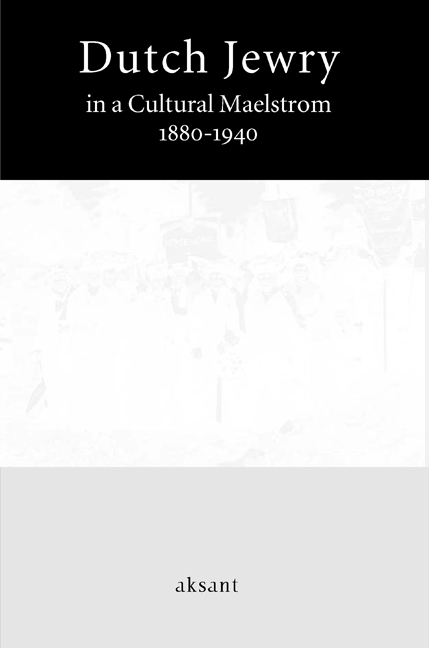Book contents
- Frontmatter
- Contents
- Foreword
- The New “Mosaik”: Jews and European Culture, 1750-1940
- The Politics of Jewish Historiography
- “The First Shall be the Last”: The Rise and Development of Modern Jewish Historiography in the Netherlands Until 1940
- Epigones and Identity: Jewish Scholarship in the Netherlands, 1850-1940
- Judaism on Display: The Origins of Amsterdam's Jewish Historical Museum
- De Vrijdagavond as a Mirror of Dutch Jewry in the Interbellum, 1924-1932
- “Holland is a Country which Provokes Serious Reflection…”: Images of Dutch Jewry in the German Jewish Press
- Spinozism and Dutch Jewry between 1880 and 1940
- Spinoza's Popularity in Perspective: A Dutch-German Comparison
- Mozes Salomon Polak: Jewish “Lerner” and Propagator of Freemasonry, Spiritualism, and Theosophy
- Jewish Women, Philanthropy, and Modernization: The Changing Roles of Jewish Women in Modern Europe, 1850-1939
- Roosje Vos, Sani Prijes, Alida de Jong, and the others: Jewish Women Workers and the Labor Movement as a Vehicle on the Road to Modernity
- Stemming the Current: Dutch Jewish Women and the First Feminist Movement
- Dutch Jewish Women: Integration and Modernity
- Index of Names of Persons
- Index of Subjects
Jewish Women, Philanthropy, and Modernization: The Changing Roles of Jewish Women in Modern Europe, 1850-1939
Published online by Cambridge University Press: 26 January 2021
- Frontmatter
- Contents
- Foreword
- The New “Mosaik”: Jews and European Culture, 1750-1940
- The Politics of Jewish Historiography
- “The First Shall be the Last”: The Rise and Development of Modern Jewish Historiography in the Netherlands Until 1940
- Epigones and Identity: Jewish Scholarship in the Netherlands, 1850-1940
- Judaism on Display: The Origins of Amsterdam's Jewish Historical Museum
- De Vrijdagavond as a Mirror of Dutch Jewry in the Interbellum, 1924-1932
- “Holland is a Country which Provokes Serious Reflection…”: Images of Dutch Jewry in the German Jewish Press
- Spinozism and Dutch Jewry between 1880 and 1940
- Spinoza's Popularity in Perspective: A Dutch-German Comparison
- Mozes Salomon Polak: Jewish “Lerner” and Propagator of Freemasonry, Spiritualism, and Theosophy
- Jewish Women, Philanthropy, and Modernization: The Changing Roles of Jewish Women in Modern Europe, 1850-1939
- Roosje Vos, Sani Prijes, Alida de Jong, and the others: Jewish Women Workers and the Labor Movement as a Vehicle on the Road to Modernity
- Stemming the Current: Dutch Jewish Women and the First Feminist Movement
- Dutch Jewish Women: Integration and Modernity
- Index of Names of Persons
- Index of Subjects
Summary
Attention to women's roles and the importance of gender as a category of analysis has changed the face of historical writing over the last thirty years. As scholars have noted, history – especially Jewish history – is a rather conservative endeavor. Arguably, Jewish history has been slower to introduce and validate “newer” approaches. Until the 1980s, attention to Jewish women remained relatively limited in the discipline; now however, we have a substantive and growing body of literature that sheds light on Jewish women's lives in an impressive range of times and places.
My presentation draws broadly on the work of other scholars as well as my own research on British Jews. It compares and contrasts the ways European and American Jewish women mediated the promises and challenges of modernity by focusing on women's philanthropic activity at the turn of the century – a time of increasing urbanization, migration, secularization, and upward mobility for a large percentage of the women involved. During this period, women developed programs to respond to communal and philanthropic needs – efforts that sustained Jewish life – and reflected modern Jewish women's identity as women and Jews. Women's increased education, careers, social welfare activity, and most recently, enlarged role in religious life, challenged age-old patterns of male leadership, opened communal affairs to women, and redefined what it meant to live a Jewish life.
GENDER AND PHILANTHROPY
Beginning in the late nineteenth century, middle-class Jewish women in Europe and America widened their spheres of activity, building on traditional roles and expanding them in ways common among their non-Jewish sisters. In extending pre-existing roles, club women's activities, as Beth Wenger notes, “often belied the norms of traditional female behavior which had inspired the founding of their organizations”, and allowed women quietly and radically to redefine Jewish women's behavioral norms. Through charitable work, women developed skills that brought them respect. Perhaps so, but my own research on Britain suggests more ambivalence. Female activism and philanthropy generated feelings of pride and satisfaction among women and some men, but men in particular could be quite critical, convinced that women would neglect their real, that is domestic, work.
- Type
- Chapter
- Information
- Dutch Jewry in a Cultural Maelstrom1880-1940, pp. 139 - 154Publisher: Amsterdam University PressPrint publication year: 2008



